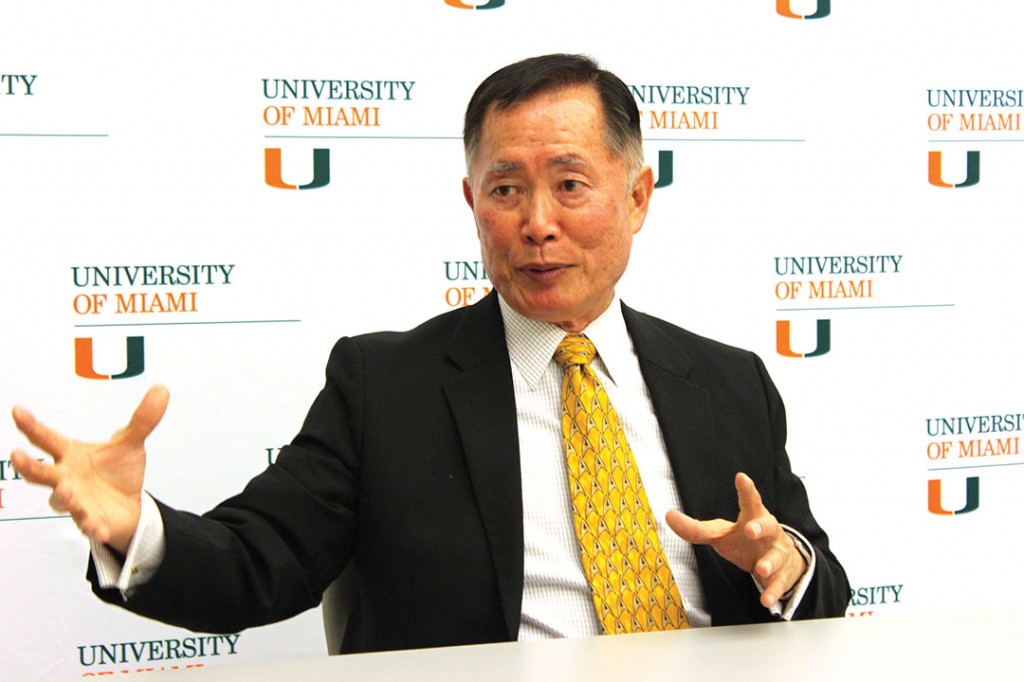

George Takei spent much of his acting career playing Sulu on “Star Trek,” roaming galaxies, battling aliens and sometimes getting imprisoned for the good of the Enterprise crew.
But for Takei, prison was all too familiar in real life. He lived in an Arkansas internment camp for Japanese-Americans during World War II, as a result of the Pearl Harbor attacks.
“I could see the barbed wire fence outside the window,” he said.
The openly gay actor, author and activist came to campus Tuesday and talked about equality and social activism as it concerns students.
The student organization SpecrtrUM organized the event and invited Takei. A member suggested that the university should ask a gay speaker to speak on campus.
“It was one of our executive board members who had met him earlier, I believe a year or two ago, and contacted his husband Brad, who manages most of Mr. Takei’s business opportunities,” said Jared Payne, president of SpectrUM.
Takei gladly accepted the offer.
“People have to be actively engaged in the issues of the time,” he told students. “There are many issues coming up, and there will be other issues coming up for you to be active participants.”
Takei’s own experiences with questioning equality began during his time at the internment camp. After Japan attacked Pearl Harbor, Japanese Americans were denied military service and sent to prison camps.
Although too young to understand the complexities of the time, the events shaped his childhood. Living in a prison camp became normal for him, and it became routine to begin the school day with the pledge of allegiance.
“I recited the words ‘with liberty and justice for all,’ too young to understand the irony of those words,” he said.
Freshman Mickey Lebowski thought Takei’s experience during Peal Harbor was especially interesting, and he enjoyed hearing about this period in history from someone who had experienced it himself.
“History books can do their part on telling you on paper the facts, but getting a first-hand account of it, there’s really nothing else compared to that,” he said.
Freshman Alex Ruhlman was also interested in Takei’s account of life as a Japanese-American during World War II.
“His tone, choice of words, and story overall immediately grabbed my attention,” he said.
Takei also participated in civil rights activism, including marching with Martin Luther King.
“Martin Luther King was only one person, and he had only one vote, but he had his voice, an eloquent voice,” he said.
Takei encouraged attendants to believe in the power that individuals hold.
Around the age of 9 or 10, Takei noticed a difference in his sexuality. However, he didn’t think he would be accepted as gay and felt alone about what he was feeling.
“I thought I was the only one,” he said.
He kept it a secret as he pursued a career in acting, an industry that put him in the public eye. He later realized he wasn’t the only one and opened up about his sexuality.
“He’s become a very passionate advocate for LGBTQ rights which is why we were interested in bringing him to campus,” Payne said. “To hear about his experiences growing up, and him, in his personal journey, really at the front of LGBTQ rights.”
Takei told students that progress for change can start right on campus.
“With gatherings like this, where we can discuss the issues of the times,” he said. “I do think the equality for the LGBT community is the civil rights movement of the first part of the 21st century.”
He explained that individuals can affect people by what they say and what they do.
“This is a people’s democracy, and our democracy can be as great as the people are, but it’s also as fallible as people are,” he said.
All individuals, Takei said, are capable of promoting equality regardless of their background.
“My life began in prison in the swamps of Arkansas, and here I am today, in front of you all,” he said.





